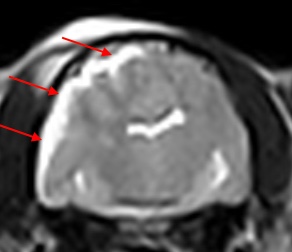
Harry The Cat’s Emergency Trip To The Veterinary Referral Centre
Harry, a 7-year old male neutered Domestic Short Haired cat presented as an emergency with a two day history of progressive weakness and abnormal behaviour several days after a reported cat fight.
Our neurologist, John Parker, assessed Harry and found that he appeared depressed, occasionally fell to the left and was borderline ambulatory. The postural reactions were delayed in all four limbs (worse on the left). The spinal reflexes were within normal limits and there was mydriasis, with the right pupil larger than the left and unresponsive to light. The menace response was absent on the left side and depressed on the right. Harry’s respiratory rate was elevated. A small puncture wound was found in the skin above the right parietal bone.
Harry’s signs were localised to the forebrain and the brainstem with possible involvement of the cerebellum.
MRI revealed the full extent of the problem. A tract was extending through the cranial vault causing extensive subarachnoid empyema affecting the right cerebral hemisphere. The increased pressure was squeezing the brain with caudal herniation of the forebrain (caudal transtentorial herniation), pressing on his brainstem and cerebellum.
After weighing up the options with the owners it was decided to go to surgery, a high-risk procedure but giving him the best chance of survival. An emergency craniectomy was performed, gently flushing and debriding a large volume of purulent material from the subarachnoid space. After a nervous night recovering under the care of our out of hours team we’re delighted to say he made a fantastic recovery, quickly back to his usual self and loving his cuddles and food. He’s now back at home and continuing to do really well, what a trooper!
Author
